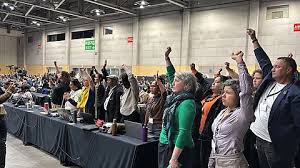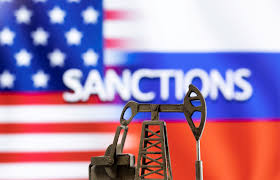Today’s Current Affairs: 19th July 2025 for UPSC IAS exams, State PSC exams, SSC CGL, State SSC, RRB, Railways, Banking Exam & IBPS, etc
Table of Contents
Just Transition in the Global Plastics Treaty:

The negotiations for the Global Plastics Treaty initiated under the United Nations Environment Assembly (UNEA) resolution 5/14 (March 2022), have brought attention to the need for a Just Transition ensuring that efforts to end plastic pollution are both environmentally sustainable and socially fair.
- Part one of the 5th session of the Intergovernmental Negotiating Committee (INC-5.1) on plastic pollution held in Busan (2024) emphasized the need for stronger legal recognition and protections for informal waste workers and other vulnerable communities.
- A just transition ensures fairness and inclusivity in the shift to low-carbon, sustainable economies by protecting workers and vulnerable communities.
- It seeks to avoid creating new injustices while trying to fix existing ones.
- It promotes green jobs, retraining, and social protection, especially for informal waste workers.
- Workers across the value chain (from production to disposal) are at risk of exclusion or economic displacement as countries move towards banning plastics and promoting sustainable alternatives.
- Informal waste pickers contribute significantly to plastic recycling
- The draft Global Plastics Treaty recognizes waste pickers’ contributions but lacks binding protections.
- It fails to define their roles in informal sectors, and Articles 8 and 9 of the Treaty merely encourage inclusion without mandating obligations, excluding informal workers from engagement. Article 11 lacks financial support for just transition programs.
- A ‘Just Transition’ ensures waste pickers are not marginalized in the shift to sustainability. Without binding protections, they risk economic displacement. A clear framework is essential for their inclusion, social protection, and retraining for greener jobs.
- India agrees with Just Transition provisions but stresses that implementation should align with national regulations and local contexts.
- At INC-5.1 in Busan, India called for a clear scope for the Global Plastics Treaty. It urged avoiding overlaps with existing agreements like the Basel, Rotterdam, and Stockholm Conventions or the World Trade Organization (WTO).
- India also stressed the treaty must follow Rio Declaration (1992) principles, especially common but differentiated responsibilities, national priorities, and the right to development for developing countries.
Massive Black Hole Merger Observed:

An international team of scientists has detected the most massive black hole merger ever observed. The event, named GW231123, was observed by the LIGO-Virgo-KAGRA (LVK) collaboration, which forms the Gravitational Wave Network.
- A black hole merger occurs when two black holes orbit each other and gradually move closer by emitting gravitational waves (ripples in space-time caused by some of the most violent and energetic processes in the universe).
- As they spiral inward, they eventually collide and merge into a single, larger black hole.
- These gravitational waves are detected on Earth by observatories like the LVK network of gravitational wave observatories.
- It involved two black holes, approximately 100 and 140 times the mass of the Sun, colliding to form a single, massive black hole about 225 times the Sun’s mass.
- The waves from GW231123 actually originated billions of years ago, but only reached Earth in 2025.
- This black hole merger, unlike typical stellar black holes under 60 solar masses, GW231123 is much bigger and spinning unusually fast, making the discovery even more intriguing.
- Black holes this big are typically thought to come from the collapse of huge stars. This event suggests that some may instead form through mergers of smaller black holes.
Noise Effect on Quantum Entanglement:

Scientists from Raman Research Institute (RRI), IISc Bangalore, IISER Kolkata have found that quantum noise can sometimes enhance, revive, or even create entanglement, challenging earlier beliefs that it only disrupts quantum systems.
- Quantum entanglement refers to a phenomenon in quantum mechanics where two or more particles become interlinked, such that the state of one particle instantly determines the state of the other, regardless of the distance.
- It forms the basis of advanced technologies like quantum computing, quantum cryptography, and quantum communication,
- Types of Quantum Entanglement:
- Intraparticle entanglement, where different properties (e.g., spin and path) of a single particle are entangled.
- Interparticle entanglement, the more common form, involving entanglement between separate particles.
- Quantum noise refers to random disturbances arising from a system’s interaction with its environment, often leading to loss of coherence (decoherence) and degradation of quantum properties like entanglement.
Public Accounts Committee (PAC) has urged a comprehensive review of UIDAI’s functioning:

The Public Accounts Committee (PAC) has urged a comprehensive review of UIDAI’s functioning after biometric verification failures led to wrongful exclusion from welfare schemes and raised concerns over data security breaches.
- PAC is a parliamentary committee that audits the accounts of the Union Government based on CAG reports.
- It Comprises 22 MPs (15 from Lok Sabha, 7 from Rajya Sabha); chaired by an opposition leader.
- Functions:
- Examines public expenditure to ensure it is used efficiently and legally.
- Reviews autonomous bodies and public undertakings funded by the government.
- Recently reviewed UIDAI based on the CAG’s 2021 report.
Issues Highlighted by PAC
- High failure rates exclude genuine beneficiaries from PDS, MGNREGA, etc.
- Worn fingerprints (manual labourers), iris mismatch (elderly).
- PAC flagged reports of Aadhaar data surfacing on the dark web.
- UIDAI claimed its central repository is secure and leaks mostly occur at enrolment centres.
- Aadhaar numbers exceed India’s population; slow deactivation after death raises risk of misuse.
- Citizens face difficulty correcting errors or resolving failed authentication issues.
- Some MPs warned of Aadhaar being accessed by non-citizens, leading to welfare misuse.
- Biometric mismatches deny genuine beneficiaries access to welfare schemes like PDS and MGNREGA.
- Data leaks and duplicated Aadhaar numbers expose citizens to identity theft and fraud.
- Frequent authentication failures and reports of data breaches reduce public faith in UIDAI.
- Fake or duplicated Aadhaar numbers enable ineligible persons to access subsidies.
- Grievance redressal failures and slow deactivation of deceased persons’ Aadhaar delay service delivery.
India has strongly opposed the proposed Russian Sanctions Act, 2025:

India has strongly opposed the proposed Russian Sanctions Act, 2025 in the U.S. that seeks to impose 500% duties on countries like India buying Russian oil.
- Russian Sanctions Act, 2025 is a U.S. congressional bill introduced by Senator Lindsey Graham, with bipartisan support, aimed at punishing countries that continue trading in Russian-origin energy products.
Key Features of the Bill:
- Section 17: Imposes 500% ad valorem tariffs on countries trading in Russian oil, gas, coal, uranium, or petrochemicals.
- Secondary sanctions: Targets non-compliant third countries like India, China, and Brazil, urging them to cut ties with Russia.
- Presidential waiver clause: Allows the U.S. President to delay sanctions for 6 months under strategic conditions.
- Tariff deadline: Recommends sanctions within 50 days, urging early enforcement.
- India sources ~38% of its oil from Russia; sudden disruption risks price shocks and supply instability.
- Seen as an attempt to arm-twist India to align with Western bloc on the Ukraine issue.
- MEA cautions against “double standards”, affirms energy diversification (40 suppliers), and maintains sovereign decision-making.
- Potential costlier imports, inflationary pressure, and reconfiguration of energy trade routes.
Kerala’s KITE Initiative:

Kerala’s KITE initiative has gained national and international attention for ethically integrating Artificial Intelligence (AI) in school education, with UNICEF recognising it as a global best practice in responsible EdTech.
- Kerala Infrastructure and Technology for Education (KITE) is the technology arm of Kerala’s General Education Department. It was established to integrate digital tools and AI in school education while ensuring transparency, inclusion, and teacher autonomy.
- Launched by: Government of Kerala
- Objective is to enable ethical, equitable, and open-source-based AI integration in public education; to empower teachers and protect student data sovereignty.
Key Features of the KITE AI Initiative:
- Mass Teacher Training: Trained 80,000+ teachers (Classes 8–12) in critical AI use, including bias detection, privacy concerns, and curricular alignment.
- Free and Open-Source Software (FOSS): Adopted across 15,000+ schools, ensuring autonomy, cost-effectiveness, and transparency in AI tools.
- Samagra Plus AI Platform: Kerala’s own RAG-based AI engine curated by expert teachers; aligns directly with state curriculum to avoid test-prep or bias traps.
- Student-Centric Innovation: Little KITEs IT Clubs train students in robotics and AI through hands-on, contextual learning; praised by UNICEF as a global best practice.
- Data Sovereignty & Bias-Resistance: By using in-house infrastructure and open datasets, KITE avoids commercial surveillance models and ensures bias-resistant AI responses.
Group of Friends (GoF) at the UN Headquarters:

India reiterated its strong commitment to ensuring justice for crimes against UN peacekeepers at a high-level meeting of the Group of Friends (GoF) at the UN Headquarters, calling accountability a strategic necessity.
- It is An informal platform of UN member states committed to advancing justice for crimes against UN peacekeepers and strengthening global peacekeeping norms.
- Launched In december 2022, during India’s Presidency of the UN Security Council.
- It Includes around 40 UN member states, co-chaired by India and like-minded countries from Asia, Africa, and Latin America.
- Objectives:
- Promote legal and policy frameworks to prosecute crimes against peacekeepers.
- Ensure deterrence by addressing impunity.
- Uphold credibility and integrity of UN Peacekeeping Operations.
- Key Functions:
- Facilitate dialogue among states, UN bodies, and experts.
- Support investigation mechanisms and legal reforms.
- Track implementation of UNSC Resolution 2589 (2021) which mandates accountability for attacks on peacekeepers.
- Advocate for reports from the UN Secretary-General on progress made.
Bihar Wins U18 Boys’ Title at Junior National Rugby 7s Championship 2025
Bihar’s rugby team clinched the U18 Boys’ title at the 10th Junior National Rugby 7s Championship 2025, held in Dehradun, with a narrow 17–15 victory over defending champions Odisha. This win not only underlines Bihar’s rising dominance in junior rugby but also completes a historic double, with the U18 Girls’ title already in the state’s grasp earlier in the week.The Junior National Rugby 7s Championship is India’s premier youth rugby tournament and a critical stage for identifying future national-level talent. The 2025 edition was hosted at Maharana Pratap Sports College, Dehradun, and featured top-performing state teams that also competed this year at the Khelo India Youth Games (KIYG) 2025.
Indian Navy Set To Participate in SIMBEX 2025:
The Indian Navy is participating in the 32nd edition of SIMBEX (Singapore-India Maritime Bilateral Exercise) in Singapore, continuing a long-standing tradition of maritime cooperation with the Republic of Singapore Navy (RSN). This exercise reflects India’s growing naval engagements in Southeast Asia under its Act East Policy and Vision SAGAR, aligning defence and diplomacy in the Indo-Pacific.SIMBEX began in 1994 and is one of India’s longest uninterrupted naval bilateral exercises. Originally named Exercise Lion King, this engagement has evolved into a complex and high-value maritime coordination effort.
57th International Chemistry Olympiad 2025:
India has once again showcased its strong foundation in science education by winning two gold and two silver medals at the 57th International Chemistry Olympiad (IChO) 2025, held in Dubai, UAE. With this performance, India secured sixth place globally among 90 participating countries, underlining its growing presence in international academic competitions.The International Chemistry Olympiad (IChO) is an annual global competition that brings together some of the brightest high school students from around the world to test their theoretical knowledge and practical skills in chemistry. India has been competing in the IChO since 1999 and has maintained a strong performance record.
Nelson Mandela International Day 2025:
Nelson Mandela International Day, observed annually on 18th July, commemorates the birth of Nelson Mandela, South Africa’s first Black President and a global icon of peace, justice, and reconciliation. Recognized by the United Nations in 2009, the day promotes the values Mandela stood for—freedom, dignity, equality, and human rights by encouraging individuals to engage in community service for 67 minutes, symbolizing the 67 years Mandela spent serving humanity.Nelson Mandela Day was first introduced by the Nelson Mandela Foundation in 2009 and was later officially adopted by the UN General Assembly. Mandela, known for his leadership in the anti-apartheid movement, spent 27 years in prison and emerged as a unifying leader who laid the foundation for a democratic South Africa.
Deepika Sehrawat Wins Prestigious Poligras Magic Skill Award:
Deepika Sehrawat became the first-ever Indian player to win the Poligras Magic Skill Award for her extraordinary solo goal against the Netherlands during the 2024–25 FIH Hockey Pro League. This recognition reflects both her individual brilliance and India’s growing impact in international women’s hockey.Deepika hails from Hisar, Haryana, and first made headlines at the 2018 Sub-Junior National Championships by scoring 16 goals, earning her the Best Player title. She debuted in the junior national team during the Youth Olympic Qualifiers (2018) and was part of India’s squad in the 2021 Junior Women’s World Cup and the Junior Asia Cup, where India secured gold. She made her senior debut in 2021-22 FIH Pro League.




